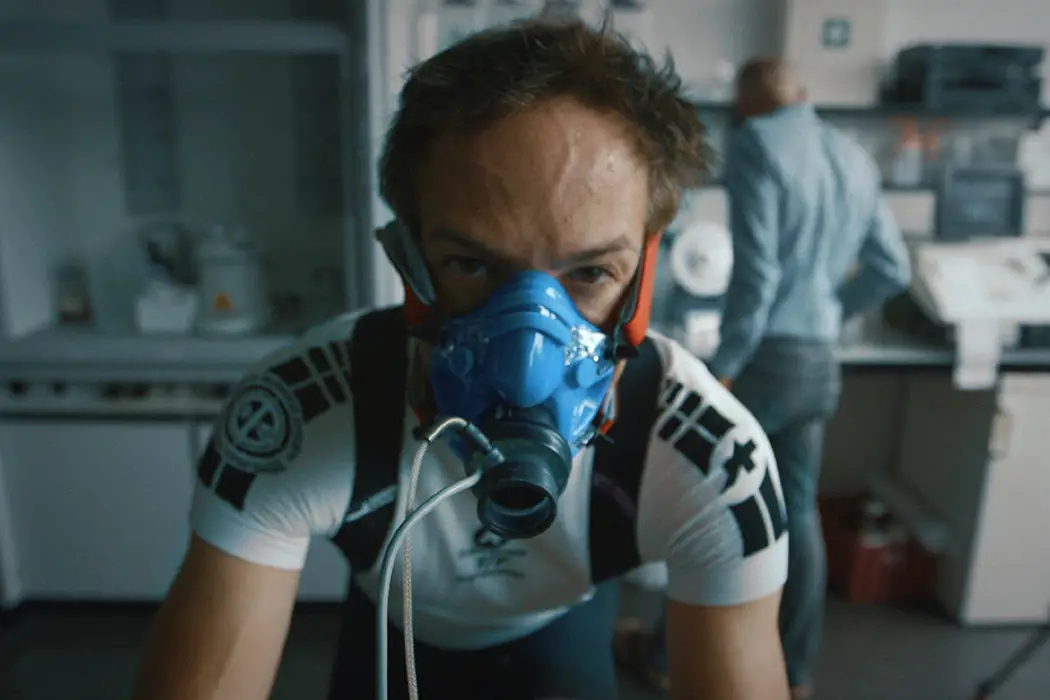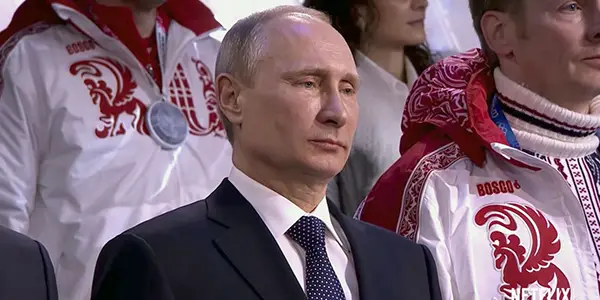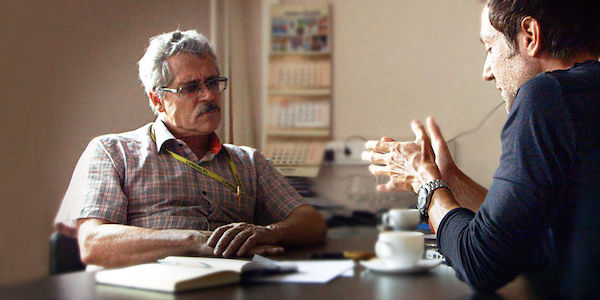ICARUS: Top-Level Cheaters

Eric D. Bernasek lives on the island just north of…
Icarus is not the documentary that its director, Bryan Fogel, had in mind. Before starting work on his Super Size Me-style sports-doping exposé cum Russian spy thriller, Fogel had been the creator of Jewtopia, a successful off-Broadway play that he parlayed into a book and then a movie, about a Gentile who pretends to be Jewish for romantic gain. When away from the Hollywood scene, Fogel was also a cyclist who aspired to crack the top ten in the Haute Route, one of the sport’s most challenging amateur events.
Faced with firsthand knowledge that, even among amateurs, cycling success frequently involves performance-enhancing drugs (PEDs), he hit upon a plan: find a doctor to give him the drugs, a scientist to help him beat the anti-doping tests, and film it all in order to expose the hidden truth that everyone more or less already knew. But when collaborator Don Catlin, founder of the UCLA Olympic lab, gets cold feet, he suggests a replacement who ends up leading Fogel down a rabbit hole of state-sponsored Russian conspiracy and corruption.
The replacement, Grigory Rodchenkov, immediately becomes an all-too-willing participant in Fogel’s plan, advising him on what drugs to take and how to avoid getting caught. Gradually, Fogel comes to know that Rodchenkov is not just a knowledgeable accomplice. He’s also at the heart of a decades-old conspiracy to cheat at Olympic sports, a conspiracy that’s delivered dozens of medals to the Russian Federation all with the help of the FSB and the enthusiastic support of Vladimir Putin.

Naturally, Fogel decides to shift focus from the deep-rooted culture of doping in competitive cycling to Rodchenkov and his eventual role as a whistleblower on Russia’s state-sponsored program for cheating at Olympic sports. Because much of Rodchenkov’s story deals explicitly with Putin – his ambition, his unscrupulousness, and the ruthlessness with which he pursues his objectives – Icarus seems ready-made for the current political moment, in which Russia has apparently moved on from fixing sports to fixing elections.
Deal-makers at Netflix apparently agreed – they purchased Bryan Fogel’s film for $5 million, an almost unprecedented sum for a non-fiction feature, at Sundance in January of 2017. Icarus premiered on Netflix on August 4th, just one day after news broke that special counsel Robert Mueller had established a grand jury to help in his investigation into the possibility that Donald Trump’s presidential campaign had colluded with Russia to win the 2016 U.S. election. Public fascination with the machinations of Vladimir Putin is well established. But did Netflix get what it paid for?
Two is Not Always Better Than One
There is a significant difference between the film as planned and the actual documentary that circumstance eventually forced into existence. It’s remarkable that Bryan Fogel was both willing and able to set aside his original idea for the project in order to follow Rodchenkov’s story wherever it lead. But the end result, instead of being a single, unified, compelling narrative, too frequently feels like what it is – two separate documentaries forced into one.
The two stories may be related, but they’re not the same. Each has its own ideas, and each reaches its own conclusions. Though the film’s overall focus changes at one point, the original story and its objectives are never completely abandoned. They’re still there, hanging around the edges of the new story, often getting in the way. Luckily Icarus is, on the surface, so competently assembled, and the story that it tells is, in the moment, so emotionally captivating that it can be easy not to notice what a mess it really is.
When not immersed in Rodchenkov’s personal story and the film’s concern for his legal and physical safety, we’re left with the larger ideas that Icarus attempts to grapple with, and at times they come rushing at us in a way that’s so scattershot the film’s overall effectiveness is significantly compromised. There are clearly themes that belong to the original documentary and themes that belong to the documentary Icarus unexpectedly became, and those two thematic worlds repeatedly brush up against each other with so little apparent forethought that it’s difficult to say what the whole thing is really all about.

In America, the black hole of Trump’s presidency somehow sucks everything into itself, to the point that it can force us to see whatever happens in relationship to Trump and the chaos he creates. Of course, in this case, Icarus benefits from that association. Though the aspects of the story that deal with Russia and Putin are presented without mention of Donald Trump – as is appropriate; the events depicted happened before he took office – it is nearly impossible to watch the film without thinking about how Putin’s ambitions have reached beyond Olympic sports into the American political system.
Viewing Icarus through that lens can lend greater significance to what we think it has to say. It can also elevate our perceived importance of the film, beyond a story that’s merely about integrity in sports to something much more consequential. In exposing the Russian conspiracy and documenting the International Olympic Committee’s reaction to it, Bryan Fogel accomplishes what he had first set out to do – showing that doping happens and that groups like the World Anti-Doping Agency (WADA) are powerless to prevent or even to detect it. And yet it’s ironic that the moment at which Icarus actually accomplishes its original goal, it is completely overshadowed by the firestorm of political intrigue that surrounds it.
Heroes and Villains in Icarus
When it’s all over with, it’s difficult to pin down exactly what it is that Icarus has to say. What does it ultimately tell us about the world in which we live? It’s not clear that the film has a compelling answer to this question. The film’s tagline – “truth is the new banned substance” – is certainly intriguing but, like the film itself, feels like a mix of two ideas, neither one of which the documentary presents clearly enough to be fully understood. At most, we might say that “truth” in general is a major theme in Icarus.
At the start of the film, Fogel is a true believer from whose eyes the veil has recently been lifted, and the quasi-religious zeal with which he had previously pursued athletic achievement, untainted by pharmaceutical enhancement, is at first redirected towards exposing hypocrisy and corruption. But once Fogel has met Rodchenkov, his new mentor works hard to reeducate the naive apprentice: “You are a victim of your ideas… I am freeing you from your anti-doping paranoia.” For his part, Fogel appears easily persuaded, soon taken in by Rodchenkov’s charm, openly pining to visit him in Russia, which he speaks of with a reverence that suggests he sees it as a sort of pilgrimage.
The film’s depiction of both men sometimes borders on cultural caricature, with Fogel playing the part of a naive and innocent American whose earnest purity Rodchenkov corrupts with his gross manipulation of what god has given, solely for the sake of winning at sport and undermining the moralizing West. For his part at least, Rodchenkov is more complicated, yet complexity is not enough to redeem the darker aspects of his character.

Yes, coercion played the biggest part in pressing Rodchenkov into service to Mother Russia, and self-preservation is largely what compelled him to heed the call. Still, he displays genuine faith in the effectiveness of PEDs as well as pride in his ability, as a scientist, to help athletes pass the anti-doping tests. During Fogel’s interview with him, Rodchenkov singles out “the most important Yes,” the point in the story that seems to him to represent his greatest downfall – that in cheating WADA Russia abandoned science, Rodchenkov’s science, and opted for brute force instead.
Later, when Fogel meets with WADA officials to reveal how Russia cheated them, Professor Christiane Ayotte, director of the WADA lab in Montreal, wants to know if Rodchenkov is sorry. Rodchenkov was the mastermind of a plot that has humiliated Ayotte and her fellow scientists at WADA and robbed presumably honest athletes of Olympic medals. Is Rodchenkov sorry? Fogel deflects, asking that we remind ourselves of the very real sacrifice his friend has made in service of the truth. But it’s a fair question. Is Rodchenkov sorry? Despite the film’s (and, perhaps, its director’s) desire to make a hero out of Rodchenkov, it seems that he’s fled Russia out of fear for what’s coming down the pike – allegations have already surfaced, and a friend and accomplice has died under mysterious circumstances – not necessarily because he’s decided that what he did was wrong.
Earlier in the film, when the doping scheme fails to improve Fogel’s standing in the Haute Route, he concludes that “I could have been 21 years old and taken all the blood bags and EPO in the world, and I was still not going to be a Tour de France champion. It doesn’t… It doesn’t matter.” In other words, the drugs are beside the point. They may give you an edge, but underneath that edge are talent and ability and hard work and (as Fogel’s own experience proves) the intervention of circumstance that we’ve come to call “luck.”
What is Rodchenkov’s reaction to all of this? Don’t give up after just one failure. “You are just like in the reception. You did not enter the first floor. Then there is a second, and so on.” You’re just starting with the drugs. Have faith, and they will make you better. When Fogel asks, “What’s on the second floor?” Rodchenkov’s response is… telling: “When you come to Moscow, you will see.”
In his conversations with Fogel, Rodchenkov repeatedly presents the culture of PEDs in explicitly religious terms, which is both a sort of running joke and an indication of his ideological dedication to that culture. Even more relevantly to Ayotte and WADA, Rodchenkov is in fact proud of the 13 gold medals the Russians won at the Olympics in Sochi, and he speaks of them as if they were his.
All of this could make for interesting and nuanced elements in a larger discussion about drugs in sports. But that’s ultimately not what Bryan Fogel decided this documentary would be about. Has including it added value to the end result, or has it just made it more difficult to see the forest for the trees?
Who is The Real Son of Daedalus?
The Greek myth of Icarus is a cautionary tale about the consequences of hubris and ambition. The documentary Icarus doesn’t appear to be about those things at all. At the outset, Lance Armstrong’s fall from grace is an important precursor to Fogel’s awakening. And Fogel’s failure at the Haute Route, after soliciting Rodchenkov’s illicit help, could be another story about the apparent consequences of ambition. But neither of these things are the focus of this film.
Rodchenkov, meanwhile, has little if anything to do with cautionary tales. The film has no interest in seeing that he’s punished, preferring instead to treat him as its whistleblowing hero and – with its closing shot of Rodchenkov frolicking on the beach with Fogel’s dog – is eager to give him some semblance of a happy ending.
Lastly, Putin and his cohort, though undeniably arrogant and ambitious, are not punished for that in any way. If Putin’s machinations are what Icarus is truly all about – and, by the time the credits roll, this appears to be the case – then Russia’s president may have flown too close to the sun, but instead of plummeting into the sea, he has managed instead to continue flying, simply through the power of his barefaced denial that gravity exists.
The film’s relationship to its title is curious. Perhaps, like many other aspects of the final cut, the title is just a holdover from whatever it was that Bryan Fogel at first imagined his documentary would be. “Icarus,” again, like the film itself, is flashy and evocative, but it makes less and less sense the more deeply you think about it.
What do you think Icarus has to say about the world in which we now live?
Icarus is now available for streaming on Netflix.
Does content like this matter to you?
Become a Member and support film journalism. Unlock access to all of Film Inquiry`s great articles. Join a community of like-minded readers who are passionate about cinema - get access to our private members Network, give back to independent filmmakers, and more.
Eric D. Bernasek lives on the island just north of the island that is Montreal. He thinks too much and writes too little. He is currently working on a book about movies from your childhood: "Does Barry Manilow know that you raid his wardrobe?" – Authority and Rebellion in Movies About High School.













